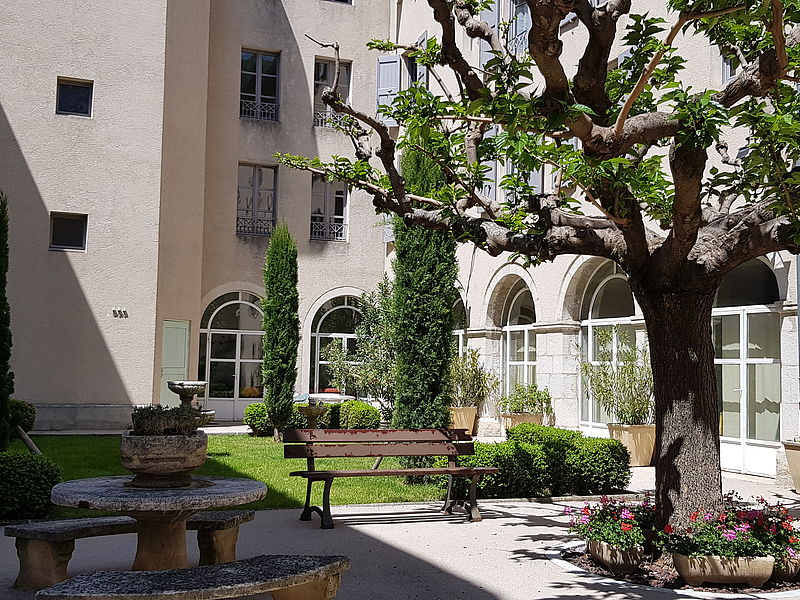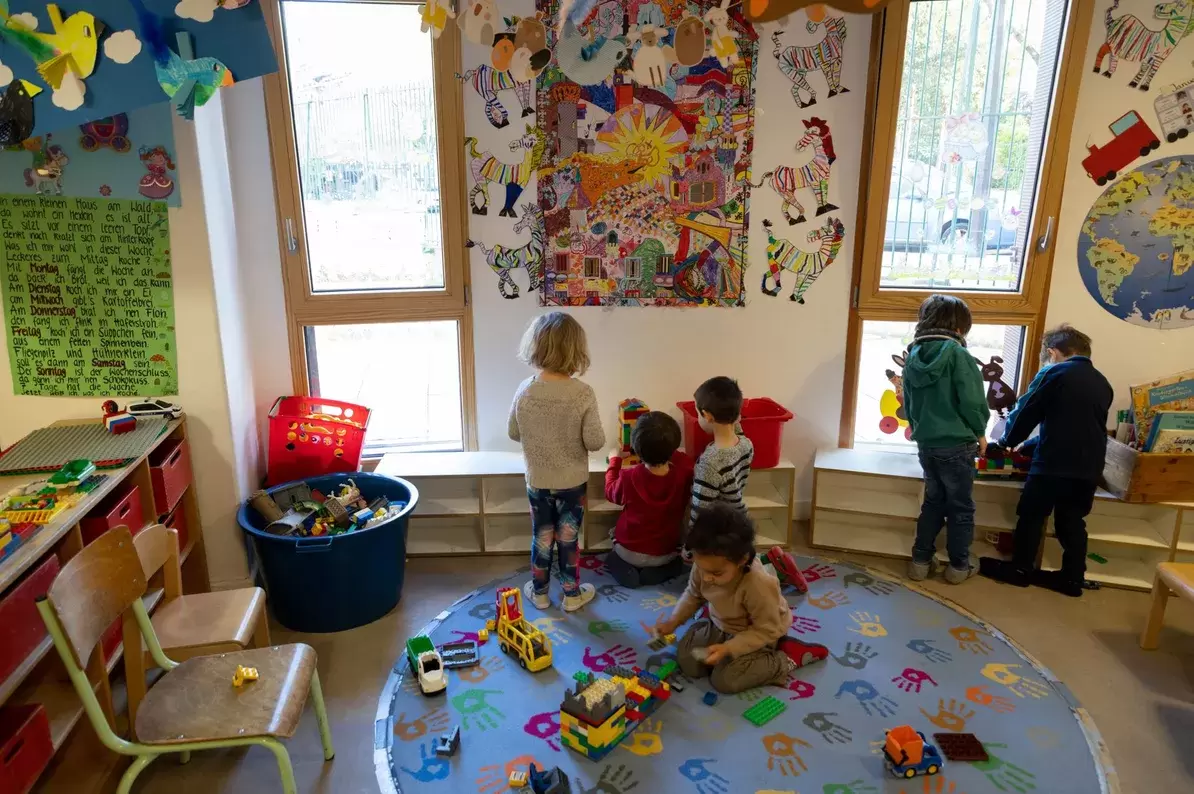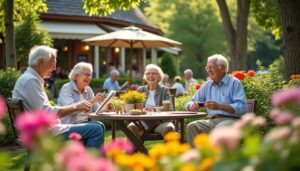In a context where the aging population in China poses significant challenges, kindergartens private sector are taking remarkable initiatives to adapt to the growing needs of elderly people. The reconversion of these structures into retirement homes represents not only a response to the significant drop in births, but also an opportunity to revitalize the senior economy. This movement is hailed as a true example of intergenerational solidarity, bringing comfort and dynamism to a population seeking services adapted to their needs.
Private kindergartens in China converted into retirement homes
Faced with a aging population and the birth crisis, many kindergartens in China choose to be reoriented into retirement homes. This innovative trend not only meets a growing need for living spaces for seniors, but also to revitalize the economy of regions affected by the aging of the population. Beyond a simple reconversion, this initiative demonstrates a desire to innovate for the well-being of elderly people while preserving already existing structures.
A response to the demographic crisis
China is going through a period where demography is in the process of changing. The decline in the birth rate and the rapid aging of the population have led to a reconfiguration of the services offered to citizens. Many kindergartens, which struggle to attract new students, find a second life by transforming themselves into retirement homes. This reconversion makes it possible to avoid closures and preserve jobs while meeting an ever-increasing demand for services intended for seniors.
A versatile living space
In these former kindergartens, the seniors can enjoy nostalgia-filled activities, like swinging to old-time tunes. This creates a warm and friendly atmosphere where alumni meet, share and engage in fun and recreational activities. Infrastructure adapted to the needs of children is redeveloped to accommodate an older audience, thus offering a setting that is both familiar and friendly.
A circular economy model
This transformation is also an opportunity to stimulatesenior economy by highlighting their experiences and skills. Young professionals and retirees can collaborate to offer a variety of services ranging from manual activities to physical exercise sessions, thus creating a real intergenerational dynamic. This model ofcircular economy promotes engagement and sharing between generations, allowing seniors to play an active role in society.
Institutional support for a promising initiative
Faced with this trend, the Chinese government has begun to support these initiatives, recognizing their crucial role in managing the pension crisis which is looming. These kindergartens converted into retirement homes can benefit from subsidies and aid to improve their infrastructure and train staff, thus guaranteeing dignified and enriching living conditions for elderly people. Follow the implications of this dynamic for the future of China’s retirement system: Tackling the pension crisis.
Inspiring examples across the country
Many similar initiatives are flourishing across China, illustrating a collective desire to adapt to new challenges. For example, in Taiyuan, in the north of the country, former daycare centers have become leisure centers for the elderly, providing a space for sharing and personal development. To learn more about these transformations, check out this article on International Mail.
The challenge of adaptation
Despite the obvious benefits of this reconversion, challenges persist. Structures must adapt to the varied needs of seniors, whether it concerns medical care, adapted services or social activities. Managers must also be concerned with the integration of these new residents, ensuring that they maintain a positive and dynamic atmosphere that respects their dignity. Teams must be properly allocated and trained to manage this transition and provide an enriching experience for residents.
Towards a promising future for seniors
The conversion of kindergartens into retirement homes in China is a promising approach that illustrates how societies adapt to contemporary challenges. It offers a sustainable solution to senior care, while preserving meaningful living spaces. THE elderly people who attend these centers enjoy an improved quality of life, engaging in activities that promote their physical and mental well-being. These initiatives can be a model to follow for other countries, facing a future where intergenerational solidarity will be essential to building more inclusive societies.

A bold transformation
Faced with a aging population and one birth crisis growing, private kindergartens in China are adapting by transforming their premises into retirement homes. This initiative was received positively, because it not only ensures the sustainability of these establishments, but also responds to the challenges of a sector of senior services in full expansion.
Meet a growing need
There demand for services adapted to the elderly continues to increase. Former daycare centers, now leisure centers for seniors, offer a familiar setting while meeting the specific needs of retirees. These new spaces allow seniors to gather, socialize, and participate in enriching activities that stimulate both their minds and bodies.
An innovative economic model
By reconfiguring their activities, these private establishments avoid closure and contribute to the economic vitality of their region. This model makes it possible to efficiently exploit existing resources while promoting job creation. The structures thus converted attract investments and contribute to local dynamism, while improving the quality of life of seniors.
Promote intergenerational interactions
Transforming kindergartens into retirement homes is not limited to a simple reconversion of the premises. It also creates an opportunity to strengthen intergenerational interactions. Young people can benefit from the experience of elders while bringing their vitality, a dynamic that enriches everyone’s daily life.
Solutions for a better future
With the aging of the population, innovation in senior services is essential. This reconversion initiative demonstrates that with creativity and flexibility, it is possible to meet demographic challenges. Each former kindergarten turned retirement home represents a step forward towards a more inclusive future for our seniors and demonstrates the need to adapt our society to new realities.
An Innovative Initiative for a New Socio-economic Model
In response to a demographic change Significantly, private kindergartens in China are being converted into retirement homes. This transformation is not only a change of use, but also represents a strategic response to therapid increase in the number of seniors in the country. Educational groups are thus adapting to ensure the sustainability of their activities while offering essential services to elderly people. This change is seen as a step forward to boost the seniors’ economy and meet their growing needs.
A Reflex Faced with an Aging Population
While the Chinese population is aging, daycares and schools for children are seeing their attendance decline. This phenomenon, caused by declining birth rates and restrictive reproductive policies, has pushed several establishments to seek new avenues. By converting unoccupied structures into reception centers for the elderly, these establishments find a solution to the crisis, while contributing to a booming sector: welcoming seniors.
A Familiar Setting for Elders
The transformation of former kindergartens into retirement homes provides an attractive and familiar setting for retirees. Infrastructures that were once dedicated to childhood development are now adapted to provide leisure spaces, introductory workshops, as well as intergenerational activities, thus creating a warm and stimulating environment. These spaces, where older people can meet and share memories, are essential to combat loneliness and promote mental well-being.
Boosting the Senior Economy
This innovative model also contributes to the boosting the seniors economy. By focusing on the needs of a growing market, these reskillings help attract investment and create employment opportunities in the aged care sector. Furthermore, professionals trained in education can transfer their skills to offer services adapted to seniors, thus enriching the local social and economic fabric.
A Commitment to the Future
Initiatives to convert kindergartens into retirement homes highlight the importance of adapting to a changing society. They show that the education sector can play a key role in solutions to the challenges linked to an aging population. By evolving proactively, these establishments demonstrate a firm commitment to the well-being of seniors, while ensuring they do not disappear in a changing market.
The Importance of Social Innovation
This evolution towards reception centers for seniors underlines the importance of social innovation which not only meets current needs, but also anticipates those of tomorrow. By viewing older people not as a burden, but as an opportunity, society and policymakers can work together to create a future where everyone, regardless of age, can benefit from a supportive, vibrant and enriching environment.









